GOLDEN GLOBE RACE
Heroic SA seafarer Kirsten Neuschäfer plots her next adventure after sailing around the world
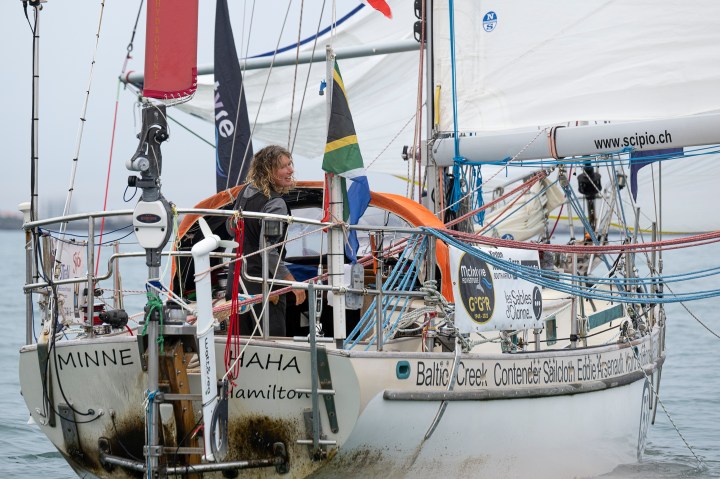
The Eastern Cape seafarer is taking in her stunning victory in the Golden Globe Race – and lots of fresh fruit – as she ponders her next adventure. A hiking trip in SA might give her some ideas.
What does someone who has spent almost eight months sailing solo and nonstop, without the assistance of modern technology or external assistance, crave upon finishing their gruelling expedition?
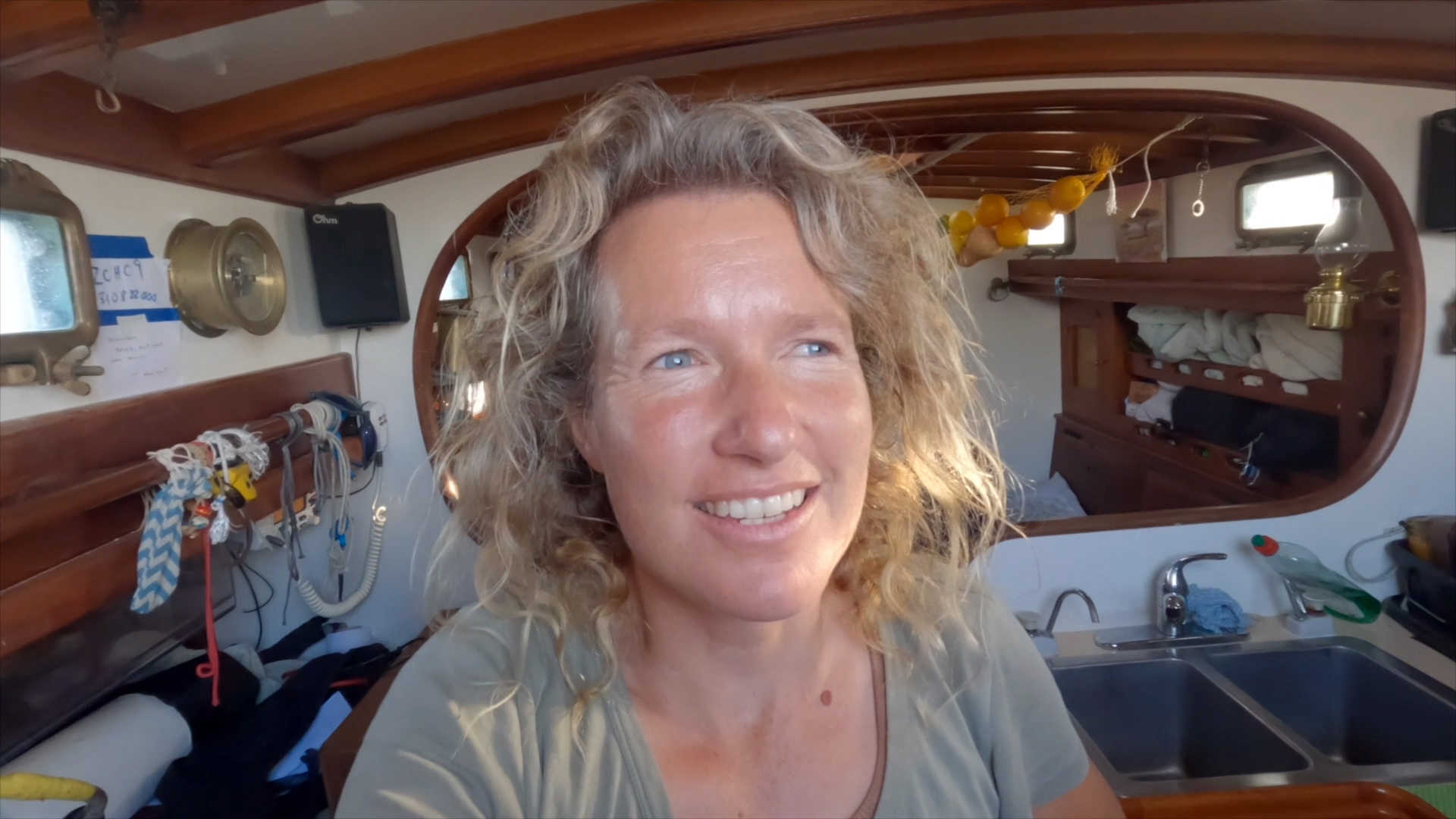
Kirsten Neuschäfer became the first woman, and the first South African, male or female, to win any type of round-the-world sailing race. (Photo: Supplied)
Maybe a mouthful of their favourite junk food? Or a warm and wholesome home-cooked meal? For South African sailor Kirsten Neuschäfer – who recently made history by winning the Golden Globe Race (GGR) – her craving was simple: fresh fruit.
“The thing I really was looking forward to eating was fruit because obviously you’re out there for eight months and you’ve got …nothing fresh,” Neuschäfer told Daily Maverick by telephone from her current base in Les Sables-d’Olonne, France, where the race started and finished.
“It was all canned food or freeze-dried food. So, I was really starting to crave fresh fruit like an orange or a banana or something like that,” she said of her diet while she spent more than 200 days circumnavigating the globe.
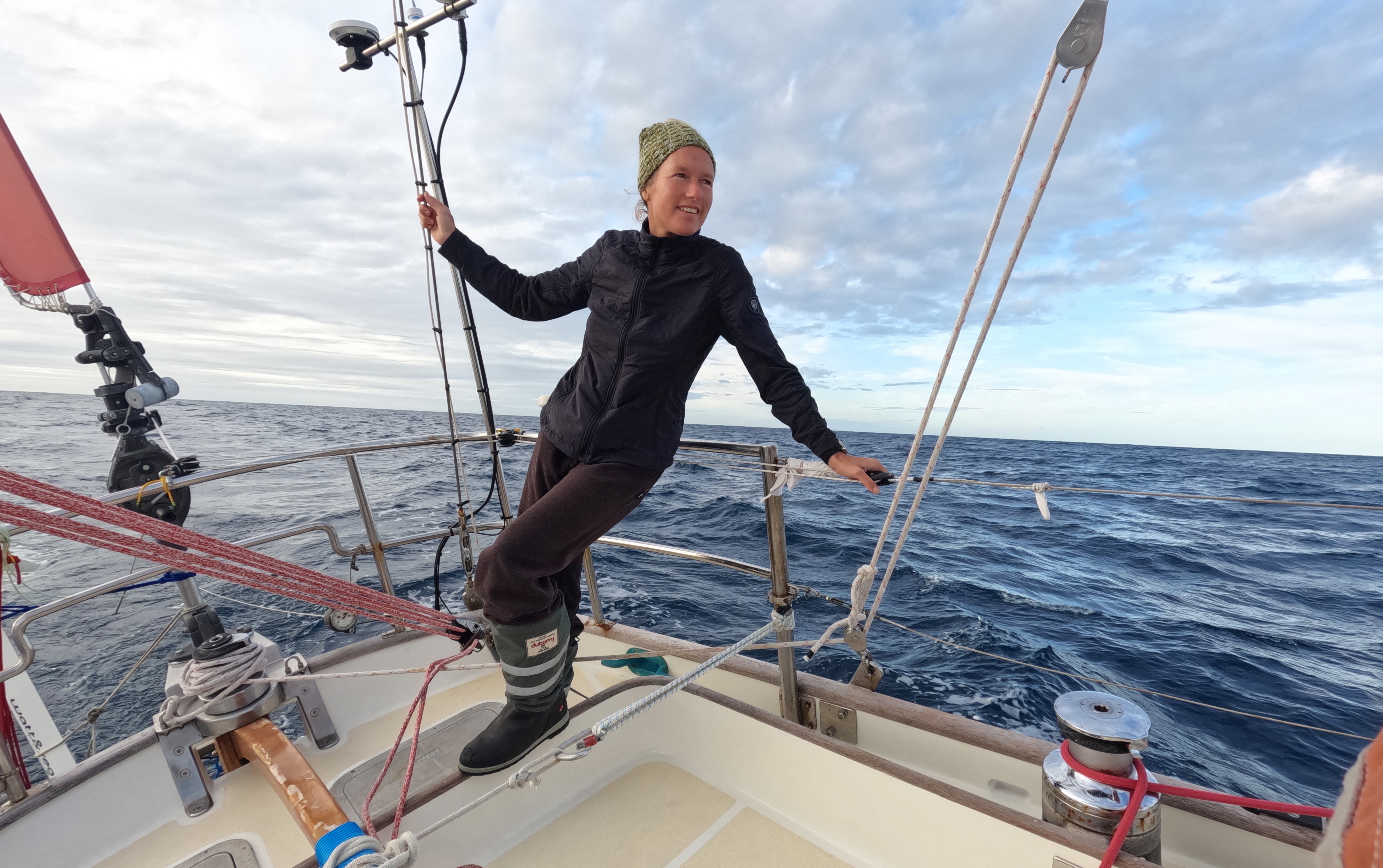
The Pretoria-born seafarer won hearts by rescuing a fellow competitor whose boat sank in the Golden Globe Race. (Photo: Supplied)
“The people here [at the finish line] were very kind. They asked me before I arrived: ‘What is it that you’re really looking forward to?’ I said fruit. So they made sure there was a big bowl of fruit for me when I came ashore,” she added.
Neuschäfer’s crossing of the finish line (on 27 April no less, a significant day in South Africa’s history) was not plain sailing, though. She could see the finish line, but there was no wind to push her over.
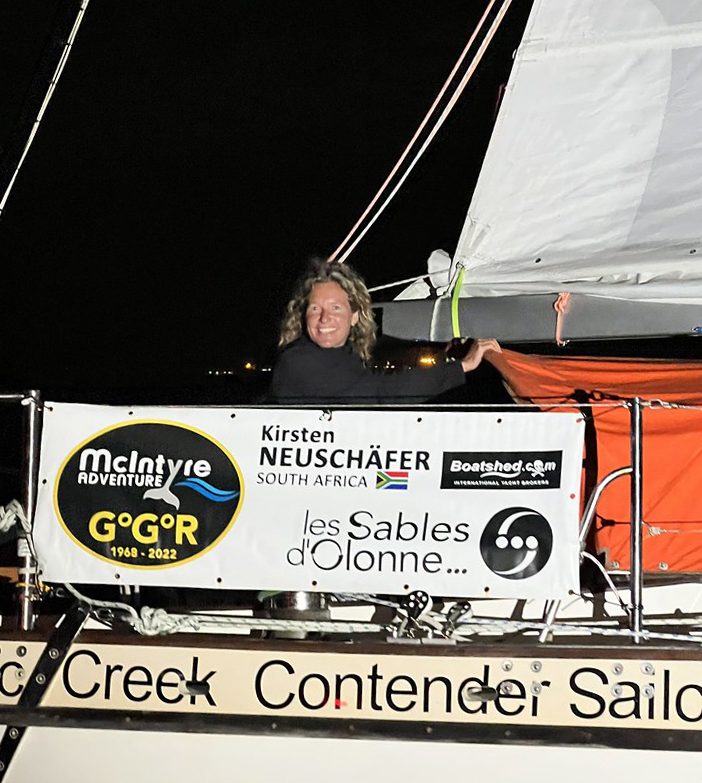
The sailor says she has left all the pages blank on to her next adventure after her history-making feat in the Golden Globe Race. (Photo: Supplied)
She ended up spending hours near the finish line, with the first boat coming out to greet her and let her know she had in effect won the race. If only the wind would pick up and rubber-stamp her incredible feat.
Rewriting history
Eventually, it did. After almost 235 days and about 48,000km of sailing, her Cape George cutter (named Minnehaha) – without any external assistance or the use of modern technology – was finally over the finish line.
When she docked, Neuschäfer became the first woman and the first South African to win any type of round-the-world race – solo or assisted, retro or modern.
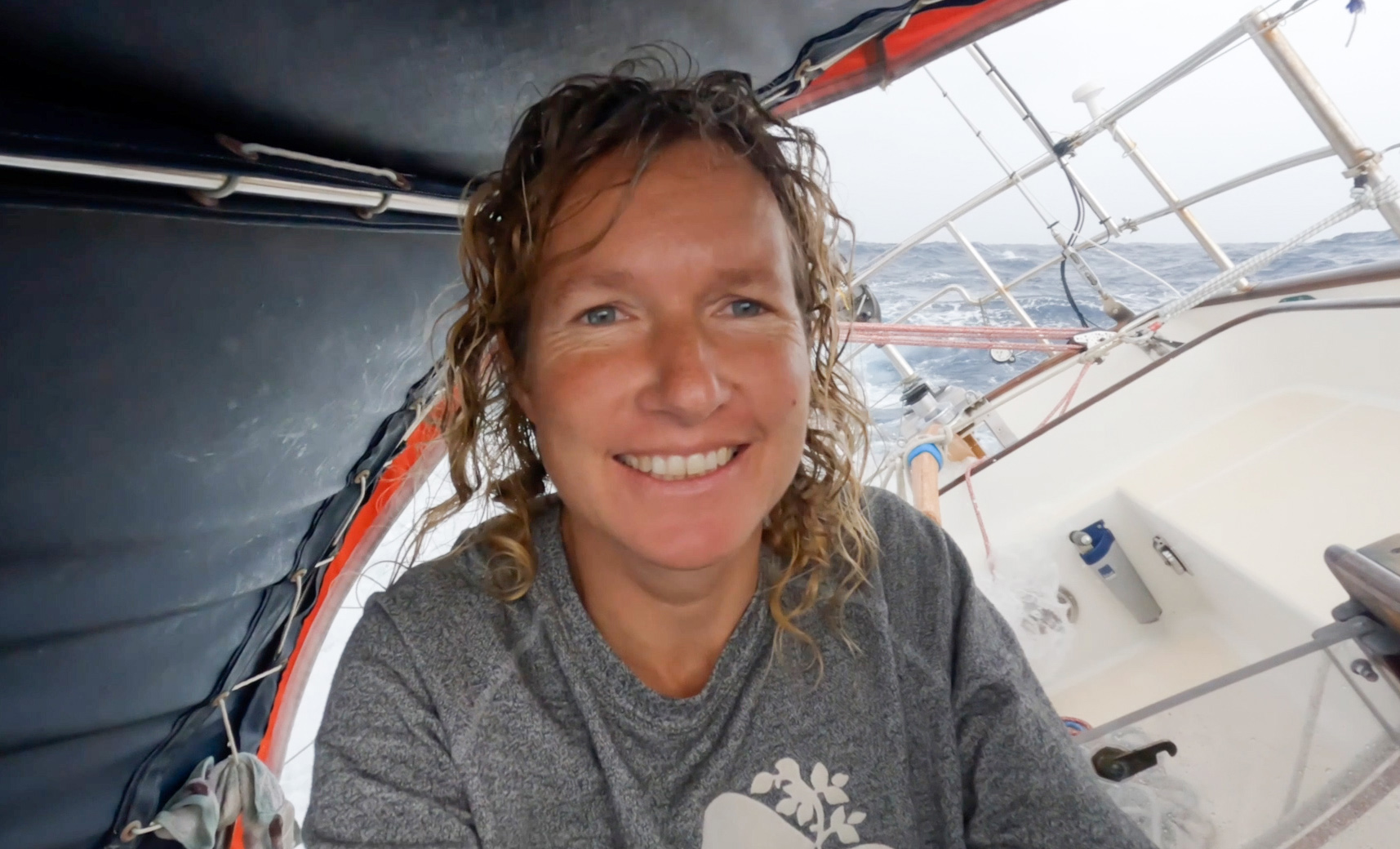
Kirsten Neuschäfer became the first woman, and the first South African to win any type of round-the-world sailing race. (Photo: Supplied)
She began her historic journey nearly eight months ago – in September 2022 – alongside 15 other skippers. She was the only woman.
Sailing has a reputation for being very macho and the starting list of the GGR was evidence enough.
Neuschäfer acknowledged the symbolism of her victory in a sport where transformation has been slow. But she said, for her, gender was not as relevant as testing her skills against some of the best sailors in the world.
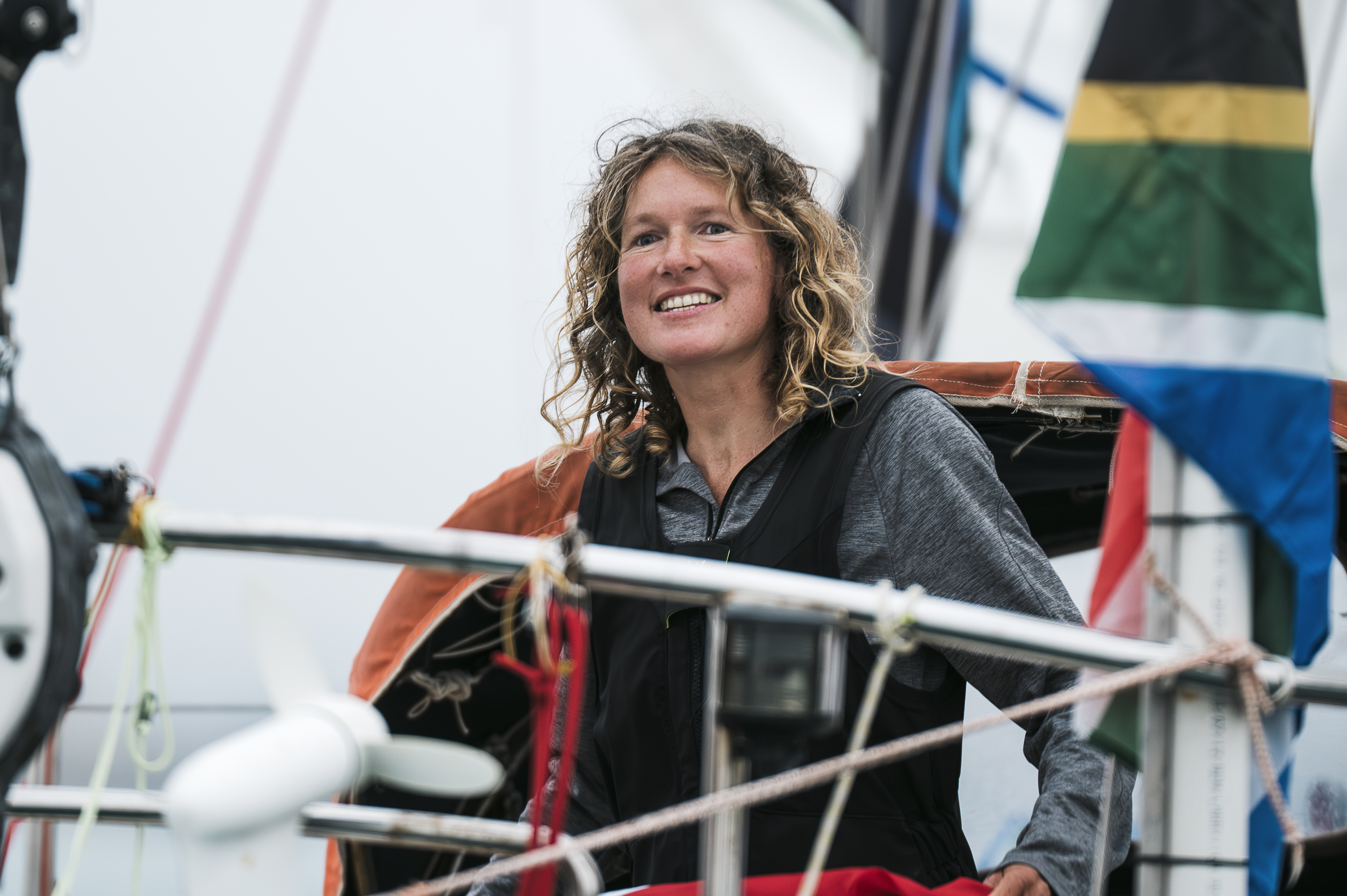
Kirsten Neuschäfer hopes to be back home in the next few weeks or so, where she will reunite with family members she has not seen in almost a year. (Photo: Olivier Blanchet / ALeA / Getty Images)
“We were all experiencing similar obstacles and had similar challenges, so it wasn’t a big thing to me. But if it is to other people and if it does inspire other women to do similar things, then I’m happy,” she said.
Making Neuschäfer’s victory even more impressive and emphatic, she was granted an extra 35 hours after she went to the rescue of fellow sailor Tapio Lehtinen, whose boat sank near Cape Town – but she did not need the extra time to seal her success.
For her effort, the Cruising Club of America named her the recipient of the 2022 Rod Stephens Seamanship Trophy. The accolade is awarded to a sailor annually “for an act of seamanship which significantly contributes to the safety of a yacht, or one or more individuals at sea”.
No wind and other challenges
Just as it troubled her close to the finish line, the lack of wind was a frequent thorn in Neuschäfer’s side.
“Like when I was coming back up the Atlantic towards France. I got into the doldrums [the belt around the Earth near the equator where sailing ships sometimes get stuck because of a lack of wind] and I sat there for two weeks with little to no wind. That was mentally very challenging because there’s nothing you can do,” she said.
“You can’t make the wind come back, but you’re not moving either. And you think about the fact that the other competitors might be gaining a big lead on you because they might be somewhere where they do have wind. So those were difficult times but, again, you can’t really quit.
“You just have to keep going because you’re in the middle of nowhere. You can’t say, ‘Oh well, I don’t feel like doing this any more.’ You have to just keep going.”
During such times Neuschäfer, whose parents live in Gqeberha in Eastern Cape, would jump into the water for a dip, just to stop her mind from being consumed by things over which she had no control.
Of course, during such times it is natural to phone someone for a chat to cheer you up. But the sailors could not do this, and would have been disqualified. After all, the slogan of the race was “sailing like it’s 1968”.
“It was a retro race. So, we didn’t have a GPS. If you couldn’t see the sun for three or four days it became more and more difficult to determine your position accurately. Because you were just working out your position by dead reckoning, you didn’t really know exactly where you were by then any more,” said the sailor.
“[This] was fine if you were in the middle of the ocean. But it became trickier if you were coming close up to land. [This] was a danger because you could sail on to a reef or into shallow waters or something like that. So that was challenging.”
She had to ration her water supply carefully, as refilling a water tank with rainwater was a risky and potentially deadly endeavour.
“If you had space in your tank to top up, you just tried to collect rainwater. That wasn’t always easy, especially in the Southern Ocean, because sometimes when it was raining it was also stormy. So, it wasn’t ideal standing around on the deck at an appropriate place to catch water,” Neuschäfer said.
In a different circumnavigation expedition, the sailors might have been allowed modern equipment to desalinate water on their journey. This was prohibited by the organisers of the GGR. But it was no problem for Neuschäfer. She made it work. Somehow.
A born adventurer
The 40-year-old has always loved adventure and exploration. It started when she was a little girl and regularly went on hikes. When she was 22, she cycled down Africa, meeting many wonderful people who accommodated her along the way. In contrast, the GGR was a solitary and personal undertaking. One of very few parallels between the two journeys was external noise from people who told her she was “crazy” and would die.
She did not listen to the naysayers. Besides her parents and sister, she has no immediate family, and no one dependent on her constant presence, making adventuring possible.
“That’s always been my first question [to naysayers]. Have you done it? Because if you haven’t, I’m not even interested in listening to you. And for every person who tells you, ‘You can’t do it,’ you’re probably going to meet 10 people who are going to believe in you,” she stated.
What her next adventure will be, she is not sure yet. First, she wants to come home and see her family, after almost a year. She plans a hiking trip along the Eastern Cape coast that will hopefully spark her creative juices for deciding what comes next.
For now, she is tending to Minnehaha’s minor mechanical needs while recovering from their epic journey. Having been loaned money by acquaintances to acquire the history-making boat, it needs it to be in tiptop condition before she resells it – something that doesn’t bother her.
“I don’t really mind because that’s kind of been my plan all along. Buy the boat, fix it, sell it off again and then pay off the debt. Unless I can think of another project to do with the boat, it probably wouldn’t be a good idea to keep it. If you own a boat and you’re not using it, [the maintenance] becomes very expensive,” she said.
“I always feel a boat needs to be sailed and used. The moment they start standing around and you don’t use them, that’s when things start deteriorating quickly in terms of maintenance and stuff like that.”
Between touch-ups to Minnehaha and coming home in the next few weeks, she will attend the GGR prize-giving on 24 June in France. Naturally, she will be the guest of honour.
For now, she is still processing the fact that, despite all the adversity she faced on the world’s waters, she not only stayed afloat, but was emphatically victorious. DM168
This story first appeared in our weekly Daily Maverick 168 newspaper, which is available countrywide for R29.


















 Become an Insider
Become an Insider
Whilst I have been tracking the Golden Globe intermittently over the past 6-months, this item in the Maverick on Neuschafer prompted me reflect on the achievements of one of the greatest sailors of all time… Joshua Slocum who sailed out of Boston aboard “Spray” in 1898.
“Minnehaha” is a traditional design and length which could be said to be comparable in some respects to “Spray”. “Minnehaha” had the benefits of twin furlers, weather-vane self-steering, top-quality sail cloth, a radio, a 12-volt electricity supply, a diesel engine, perhaps a water-maker, liferaft, a tracker and a few other gadgets… but for the rest of it, the key ingredient for both Slocum and Neuschafer came down to seamanship and the art of celestial navigation.
Neuschafer might have taken some comfort from the fact that there were a handful of competitors who might have been within a few hundred nautical miles of her position, but the reality is she was on her own, and the possibility of effective assistance in any distress situation would have been remote.
She can take pride in the fact that her solo circumnavigation without GPS, plotters and the like, is a remarkable achievement.